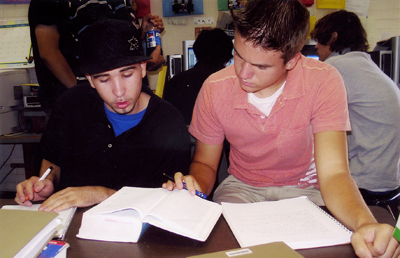All Nonfiction
- Bullying
- Books
- Academic
- Author Interviews
- Celebrity interviews
- College Articles
- College Essays
- Educator of the Year
- Heroes
- Interviews
- Memoir
- Personal Experience
- Sports
- Travel & Culture
All Opinions
- Bullying
- Current Events / Politics
- Discrimination
- Drugs / Alcohol / Smoking
- Entertainment / Celebrities
- Environment
- Love / Relationships
- Movies / Music / TV
- Pop Culture / Trends
- School / College
- Social Issues / Civics
- Spirituality / Religion
- Sports / Hobbies
All Hot Topics
- Bullying
- Community Service
- Environment
- Health
- Letters to the Editor
- Pride & Prejudice
- What Matters
- Back
Summer Guide
- Program Links
- Program Reviews
- Back
College Guide
- College Links
- College Reviews
- College Essays
- College Articles
- Back
Channelled focus or divided attention?
Saint Nicodim (in the orthodox religion) is said to have had a stunning power of concentration. Once, while soaked up in his writing of a holy book, one of his fellow monks entered his room and assuming he hadn’t eaten anything for a while, he tucked a morsel of bread into his mouth. Later that evening, upon returning to Nicodim’s room, he saw that the bread was still in his mouth, not swallowed. Such was he immersed into his activity. Conversely, the great Emperor Napoleon is known to have possessed a rare skill for multitasking. While writing, he would listen to seven different people, asking him seven different questions. Afterwards, while continuing writing, he could give minute answers that matched exactly the person they were intended to.
These are indeed some impressive skills; yet, they seem totally opposed to each other. Therefore, one shouldn’t be able to be endowed with both of them. Then which one of these characters would you most likely want to take after? Before you make up your mind, let’s go through a description of such aptitudes.
It is also named mindfulness or flow of thoughts. Concentration is required in all our daily activities, in order for them to be flawlessly seen through. Its worst enemy are distractions, which mischievously pop up in the scene and divert our attention from the task at hand. There may be inner or outer such setbacks. The externally originated ones can be more easily repelled (e.g. turn off the TV, leave your mobile phone somewhere out of reach or stow away any other luring materials). The immanent distractions, on the other hand, are more cumbersome and difficult to handle. They consist of our own thoughts and emotions that spring up without us having asked them to. For instance, while doing your homework, you might suddenly remember the quarrel you had that day at school with a classmate. Since the recollection bears an emotional charge (anger at our mate, in this case), you experience again what you felt back then. Psychologically, you enter a refraction state, during which you don’t have access to other information, but for that further bolstering your emotional state. This period can vary in length, ranging from a few seconds up to a few hours. Thus, we become our own roadblock in our way to completing our duties.
Considering this, one could say that full concentration is indeed a skill worth honing. However, some have pinned down a lapse. If you are too immersed into a certain activity, you become oblivious of things happening around you and some important events might be missed or forgotten about. Not noticing how time has passed while you were engrossed by a page-turner and now you are being late for a crucial meeting is not quite to be desired. Concentration has to come along with the ability to shift your focus appropriately when needed, otherwise is half-baked.
Multitasking or divided attention is a long debated theme, since it has not been established yet, whether it is truly a skill that can be trained. Some argue that it is rather a euphemism for lack of focus and proneness to distractions. Those who work long hours in front of a computer and especially on the Internet have been thought to be adroit multitaskers. Nevertheless, recent studies have proved the contrary. When examined, PC-workers have turned out to be pretty helpless both at tasks requiring focusing and those checking how efficiently they could split their concentration. The conclusions bore out that they could indeed shift their attention between data faster than others, but they could not fully channel it for more than a few minutes. Yet, this sort of aptitude is still widely attached to the image of an ideal employee, who can deal with more intricate problems at a time.
Personally, I believe that multitasking factually implies unsuccessfully undertaking more tasks simultaneously. Even Napoleon was actually using his concentration to focus on the questions he was asked, while writing, more of an automatism, didn’t require that much attention.
To conclude, bear in mind the following Indian anecdote. Once, a pundit was asked by his apprentice, what they should permanently take care of, in order to reach his wisdom. He responded:”Nothing simpler. When you sit, sit. When you go, go. When you arrive, arrive.” Baffled by his answer, the trainees replied they were doing all these already every day. Smiling, he cleared them out:”On the contrary. While sitting, you’re already going. While going, you’re already arriving. While arriving, you’re already sitting.”

Similar Articles
JOIN THE DISCUSSION
This article has 0 comments.
